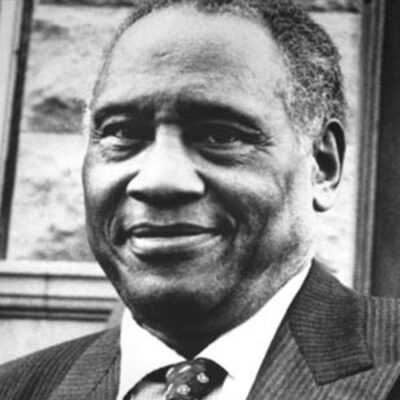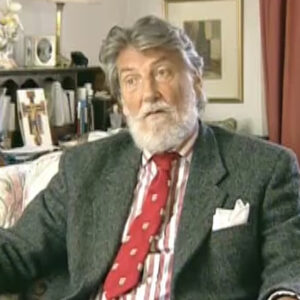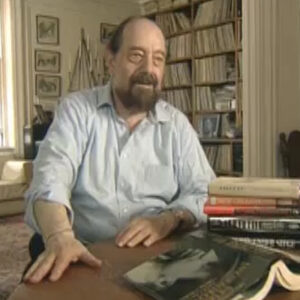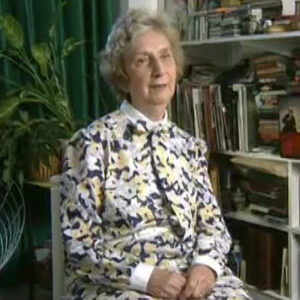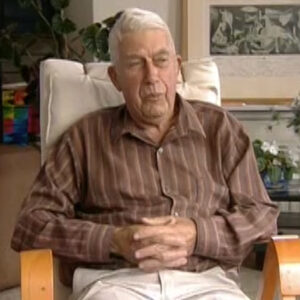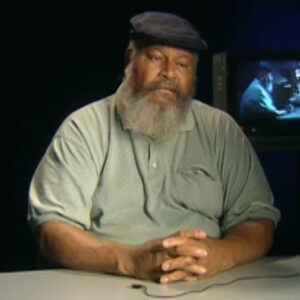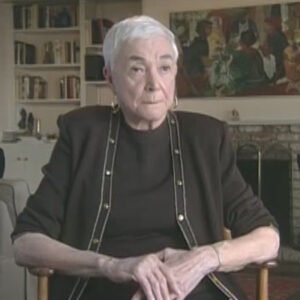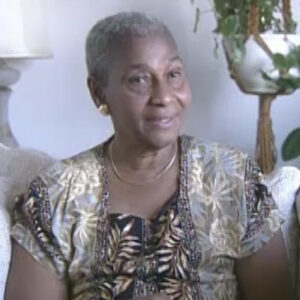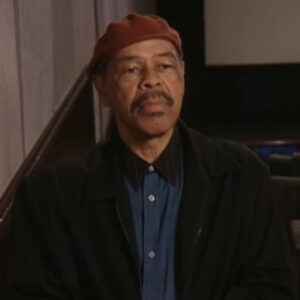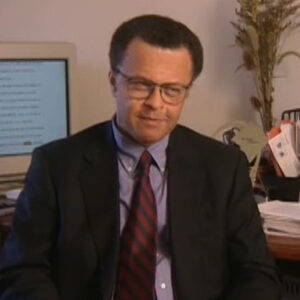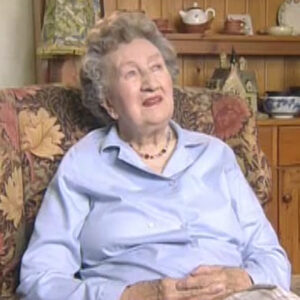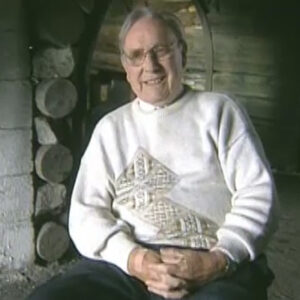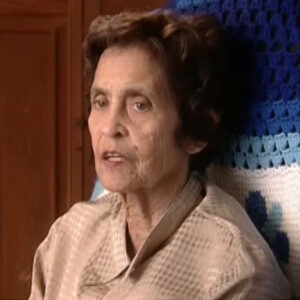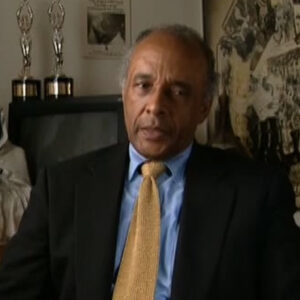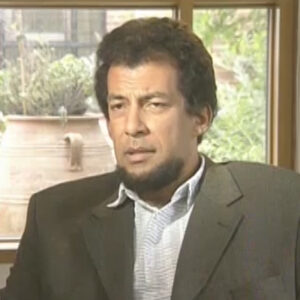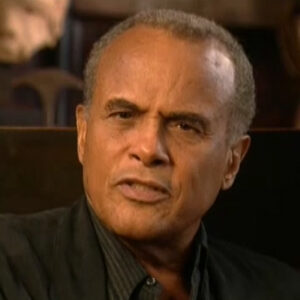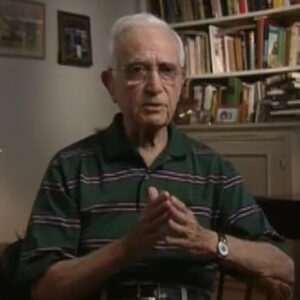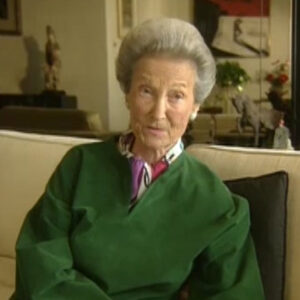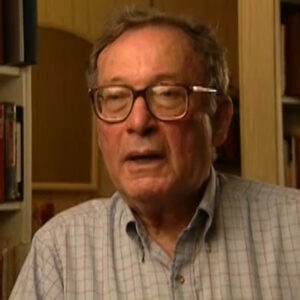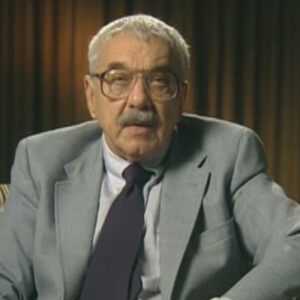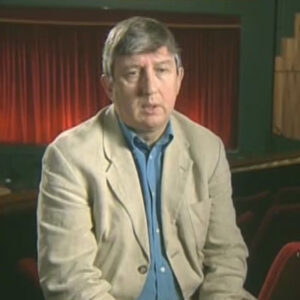Speaker 1922, the 1920s, that was soon after the major race riots in Tiger Bay in Cardiff, which also took place in Liverpool’s almost simultaneously. What happened was that in the post First World War period, a lot of black men were domiciled in these port areas. That meant that they were needed in the port areas because the local men had gone to war after the war. These men returned and found these black men had open shops and some of them had married. White women had children. And that created tremendous tension. Not only that, they were working in the ports and jobs that these men had previously held. Now, if you look at that scenario, both at Liverpool and in Cardiff, for example, it was a potential for violence, which was the spoilsports.
Speaker OK, so let’s start with.
Speaker So, yeah, so that potential for violence with the return of the soldiers in these port areas, for example, led to violence in 1919, terrible violence, and the black community was virtually pushed to the edge of starvation. Many people were forced to move out of the area or move to the edges of the area. Some black men, there was a call for black men to be repatriated back to where they came from. Most of the seamen were from West Africa, the Caribbean, some from the east, Malians. They had people from the Yemen. But these two ports, Cardiff and Liverpool, had a long standing black presence going way back to the 16th century, the 17th century, as long as the slave trade has been and being talked about so, so robustly comes in in twenty two.
Speaker What kind of treatment in London?
Speaker Well, Rosa came in and 22 as an actor and he went to Liverpool and he played there with Mrs. Campbell and a play I think called Tabu of Voodoo. Now Rube’s his position was like being in a cocoon. He said that he he lived with the working people, he ate with the working people. He shared the songs and he lived in the community. But I think he was doing so as a bit of a special case. He was living there. He was the local seaman, you know, and anyway, he wasn’t here for very long.
Speaker But also he said when he arrived at Southampton that he felt freer here or words to that effect.
Speaker He didn’t feel the constraints that he felt in America, and that’s present in a way because he was loved by many people on that first visit. And I think subsequently, that relationship that he had with working people in this country and indeed with the elite in this country had grown.
Speaker Was that that was how let’s just keep going until.
Speaker Listen here, I mean, well.
Speaker OK, OK, so so there was no violence, I mean, so would you say basically race race relations?
Speaker Yes, yes, it was race riots. It was described as race riots and in Cardiff and it’s well documented and well reported. It was clearly a black and white situation where people, the white soldiers just went for the black residents and there were residents because there were people living there for a long time. Not all were just short sellers who just managed to just jump ship or was there for a few weeks. And what about London?
Speaker I mean, how many sort of.
Speaker OK, let’s start. When you talk about Cardiff and.
Speaker But Manchester, I guess, Liverpool.
Speaker Yeah, yeah, but in London, what was the size of the black community and what were the conditions?
Speaker There was difficult, difficult to measure the size of the black community in London or indeed in any of these places. And they are rough, very rough estimates. I can’t say I’ve seen an estimate on what the size of the London black population was at that time. But I know very well that there were lots of students, West African students here. Indeed, you mentioned the West African Students Union that was set up in about 1925. There were one or two black doctors from the Caribbean and from Africa. There are some Indian students. So it wasn’t large, but it was more student population. As you know, there were lots of Pan Africanist. So the first Pan African conference was held in 1900. And people like WBB Du Bois, he had been present at that conference with a man called Bishop. But Neil Henry, Henry McNeil, he was here, also another American from the erm his own church. He represented that organisation. So it really was students. Professionals, black professionals, and these port communities, indeed, I think in London, in the east, and there were a handful of black people settled there, but it wasn’t large.
Speaker It was before Rosie got here. Was he well known by people here in London?
Speaker I don’t think he was.
Speaker If you could we ask a question if you could say Wilson was not well known?
Speaker I think Robson was not well known here. In 1925, he came to appear in the Emperor Jones on stage at the ambassador’s theatre, and he had very good reviews. Some were not so good, but in all, he had very good reviews for that particular performance. Of course, one reviewer talked about his his. His racial voice or tone of voice, and they talked about the TomTom’s that were beaten as part of the. Theatrical presentation. Apart from that, he had a very good press. So from that moment, Robertson was known in London. And I think that that was the beginning of this long stretch of popularity that just grew and grew.
Speaker Now, what the Rosen learned from being here that you see.
Speaker What throughout his entire career, the beginning and the beginning? Well, he learned that this was a place that he must be in if he’s going to make good in his career as an actor and as a singer. Well, he wasn’t singing because he came in from a country that restricted him. The restrictions in the United States were such that when he got here, he realized that given the success of the 25 production of the Emperor Jones, that now he can do anything he wants, virtually anything he wants. There were no rival black actors for the parts Eugene O’Neill had already, I think, been talking to him about the other play that he wrote called All God’s Children Got Wings and Robes and had already met. And on his first visit, he met Lawrence Brown, who would become his arranger of the music for his spirituals. And they discussed the proposition, the idea that they should do some concerts on Negro spirituals together.
Speaker Then what role did he have in the development of his career at this point?
Speaker I think they just got married in 1923, so he came here in 25, she didn’t come with him, but, you know, that was 1922. They had got married. They were married by 25. I think that she was a very strong minded, intellectual sort of person, Rabson, as she said in her book, was a lazy man with a big L, so she was the person who, it seemed encouraged and more and more to be an actor. In fact, I think that’s well documented, too.
Speaker Do you think that he was a lazy man with.
Speaker That’s difficult to tell at that stage because I think that he was I can’t support a book about him. Yes, well well, I think not.
Speaker I think that that perhaps might be some of the tensions in the marriage. But I think that he wasn’t lazy because he took on lots of other projects soon after that. Indeed, he had decided not so long after that to come to Britain where there were more opportunities so that he can act more and develop his skills.
Speaker Now, a politically, what do you think he learned from the early learning experience?
Speaker Politically, he learned that there were. Lots of different. People’s coexisting in Britain. He learned he began to learn a lot about race. He must have known of the riots that took place. He visited and met a lot of African students, Indian students. He went to the West Africa student center. They lionized him. They saw him as a leader, a man with extraordinary gifts and powers because they themselves never got that publicity. He had the stage and he began to see his talents as ambassadorial. He felt now that what was said about him earlier, that he. He will be a leader of the race. He was one of the most gifted men in New York, those things that were said before he left America, he began to get resonances of that when he saw the black people in this country and others looking up to him. So now he felt maybe there was something in this and no human being can push that aside for long.
Speaker Do you think. Can you comment on his experience with the Welsh miners?
Speaker Yes.
Speaker He very early on, I would say about 1928 when he began to do the concert tours after Showboat or thereabouts, he began to do national tours in Britain and he went to the provinces in Britain and did lots of shows and was very concerned at the high prices of his concerts. So he made an arrangement with the impresario that he should sing to the common people, the working people, and that the prices of the tickets should be lowered. Two of the major and most enduring communities that he became associated with were the community in Glasgow, the miners in Glasgow and most of all, members, especially the miners in South Wales. And he sang at the Eisteddfod, which is the music festival each year, and that seemed to have bonded them much more closely. And then he made the film proud. Valli, which starred a lot of locals who weren’t professional actors and that endeared him to them even more. It was a big hit and black people who lived in Tiger Bay when that film came out, I was so pleased and proud of Rabson. And there are lots of things on record of people who just thought Robeson was God, you know, to see a black man there. But Robson wasn’t just good for black people, the few black people in Britain. He was really something in their minds and in the estimation of a lot of white people in Britain, not least miners and working people across the board.
Speaker Do you think do you think that.
Speaker And this time. Uh, there was any element of.
Speaker Actor’s performance in his activities, in other words, they think that. He was growing and trying things or do you think he was acting out, being, you know, popular with you?
Speaker I think he he was a natural, if you could apply that word to anybody in the history of the stage or the concert stage or dramatic stage. It must be robust. And his voice was natural. And he was a natural actor. And I’ll come on to say something about his 1959, the last occasion he appeared in as Othello about this naturalness as opposed to technique because he had no technique at this time. Tell me about that now. Now, what about the technique? Yeah, well, the third time he played Othello. This is what’s coming from Sam Wanamaker I spoke to some want to make in the summer of 1986 when he said that when he met Robeson at that time, he found Rabson to be an actor, not trained and not a good actor at all. He was lacking in the technique of the stage. So. I said, what do you mean? And he says, Don’t get me wrong, Rabson and having played Othello twice already was Othello. No other person could be Othello but Rabson. And then he went on to say that. The who’s a farrier who played Iago in the 49 theatrical production in New York, made rings around and got the better of Rabson because Rube’s was lacking in stagecraft, whose therefore didn’t. So what happened in 59 is that Sam was cast to play Iago. And of course, when they started rehearsals, he found that Rabson was. Speaking shiksas, Lion Lake song, you know, he wasn’t related directly to the specific ideas of the song either, and he found the same to be true of Robe’s as saying that group says he wasn’t getting to the meaning of the words, he wasn’t getting to the emotional content of the language of the characters. So they began to improvise. And both men had known each other before in America as actors. So and trusted Sam’s intuition here. And improvisation led to an extraordinary result, really, because Sam said to me, he said, what happened was that. With ropes, musicality and the technique he built up for that 59 performance, it was the most uplifting, incredibly real truthful, powerful Othello performance he’d ever seen.
Speaker This was the last time the troops deployed after his illness or at the time his illness. So that’s a tremendous. Avocation of a man’s spirit, I mean, he was ill about that time, as you know. Anyway, that’s the story from someone to Mecca, which I have on tape. And I thought that that was very uplifting about Rabson coming towards the end of his acting career. He had technique, he learned some technique, but he didn’t have that technique in 19 in the 1920s and 30s, he was always a natural actor or was a natural voice. It wasn’t trained, trained, you know.
Speaker Do you think what what do you attribute it?
Speaker Attribute his. Sickness is tiredness, you know, and.
Speaker In the last appearance of Thelo appearance.
Speaker I think do you think he was overweight? I think he was overweight and it was said that when he played Othello in 1959, he was grossly overweight and he had a blood circulation disorder, didn’t he, and was being treated in Moscow before he came for the rehearsals here. But there was an understudy for him. You know, if things had gone wrong, he was so ill. And I think it was Gordon Heath, the American actor, very fine American actor called Gordon Heath. And he started the rehearsals.
Speaker Until we arrive here and and then groups and took over, but once I’m going to make met him, Sam was sure that this man was lacking in technique. He was not good as an actor. He was ill. OK, now, why do you think it was ill taken? Well, yes, let’s address that. He had a punishing well, he’s just come out of. That business of being un-American. He had been a man buried alive is the expression people have used passport taken, livelihood taken away, housebound. The black community for six, him with few exceptions. Roberts was virtually dead to the public, that is a powerful. Indictment to a public that you have been. Doing everything for, as you said, he everything that he’s ever done wasn’t for money, wasn’t for career, he did it for his people, his people, meaning African-Americans. And he said, sometimes I feel I’m the blackest. Man in America, that’s at a time when he discovered Africa and London in those years, in the early 30s when he met the students and he started to learn the languages and started to relate the languages to folk songs of other cultures.
Speaker And he became an African, as he said, when when during this time, when he was restrained, restricted to America. The people here, what was the reaction of the people here, the black community here and also the general public?
Speaker I think the black community here and the Welsh miners and a whole swathe, a whole cross-section of this of the British public were rooting for him to get back his passport. I think there were more fervent in their opposition to what happened and in their support for. The reissue of his passport and when he got it, of course, where did he go? He came straight to Britain and gave the first concert here.
Speaker But as you know, while he was still denied the passport, he had given a concert while he sang on the telephone to the Welsh miners, a transatlantic line. And that was an extraordinary thing to do because there were thousands of people not far from here in Kings Cross assembled in the town hall of King’s Cross and in Wales to listen to this voice coming across on the line. And then he eventually came, of course, soon after that, so.
Speaker He said that the with few exceptions, the black community abandoned him.
Speaker During his research into America, how do you mean that I mean, well, there are certain people like journalists.
Speaker Jackie Brown wasn’t exactly Robson, although he never blamed Jackie for what Jackie said, Jackie, Jack, Jackie Robinson. I beg your pardon, Jackie Robinson, that was very, very famous. And in the public eye, Jackie Robinson said that he didn’t want to be any communist and he wasn’t going to join or words to that effect. And Robinson felt that Jackie was not to blame for that. I think he was being sounded out. You know, a trap was laid there, but he didn’t fall for that one. So he said, I don’t blame Jackie for what he said. And there was the the the journalists white I forgot his first name was Walter White. And these people came out very openly and attacked Robson for being pro communist. But no one has proven whether or not he carried a card. He had sympathies as a socialist, but it was a good thing. And many intellectuals in America were socialists in the 30s, as you well know. Indeed, Sam Wanamaker was he never went back to America because there were there were. Which hunted him. So he stayed in Britain. And what did he do? His brainchild is a Globe Theatre.
Speaker Well, now the thing is, it wasn’t at the same time that certain officials and certain individuals were publicly condemning him when Jackie Robinson and Walter White, um, a lot of the only places where he could sing were black community churches or institutions. So, you know, given that, do you still think that it was the black community abandoned him or did they, in fact, largely support him and certain leaders or certain people connected to the government?
Speaker If it’s sounds strong that you know that about the black community abandoning him, abandoning him? I I don’t know what I mean is that they weren’t exactly supporting him, so if you’re not supporting the person, you’re silent. What are you doing? It’s almost like complicity with the oppressor, isn’t it? So they weren’t supporting him and he was left alone. No records could be issued. No concert halls would open the doors for him. Black community silent. His oppressors are vigilant.
Speaker For all that time, he became ill because there was no activity. He was a man very active, travelling the world going. He never complained that he was tired and suddenly he’s doing nothing. So he gets ill. He’s sick. He’s probably sick in mind, too. Yeah. Mind, body, everything. Suddenly the machine stops. The talent is no longer needed. It can’t be honed. It can’t be. The voice is silent. It can’t be expressed. There’s nothing worse than a voice having a voice that you can’t use. What a voice. He had the greatest American, the most popular man after the president or equally popular great international star goes back home and they put him in this position. I think everyone is complicit with this, you know. I think all of us in the 20th century, I think black Americans have much to answer for.
Speaker In retrospect, yeah, but what I’m saying is, is that when he when I mean, when he didn’t have when he was not able to go, that one of his concerts were canceled.
Speaker It was the black churches. I mean, he did before he performed in these churches and they were in the concert halls, you know, uh and also Ebony magazine people wrote that he, in fact, was a good guy, that they supported him. So, you know, you got. I mean, what about that?
Speaker Yes. You have to balance that. Yes. And I’m not saying everybody, but what I’m saying is that. No, no, I’m saying the majority of of people, influential blacks, never came to his aid.
Speaker A lot of them did not want to be seen to be on his side. I think you. Why do you think that is? I think perhaps these people were profiting from the status quo. Robertson was perceived as rocking the boat and. Given that communism and the Cold War and America’s position. Being what it was, no black person in any. Prestigious or responsible position, responsible position wanted to jeopardize that by openly taking jobs aside. I think it’s probably that I you know, I can’t see anything sinister about that. But that’s a human thing that they were protecting. Yeah, well, it’s sinister. And yet, at the same time, here is a human reaction to a situation where they were inadvertently being complicit with, you know, do you do you know anything about his trip to the West Indies?
Speaker Yeah, I heard about that. In fact, he went to Trinidad, where I was born and in Jamaica. And to this day, people still talk about it.
Speaker At Jacana, a Trinidadian singer and actor had welcomed him in Trinidad and the people of Trinidad and Tobago. I heard about it as a child and but ropes and the voice ropes and, you know, I never knew. One day I’ll research him and write about him. But he is a great name. I think it was the one and only or maybe it made a second one. I don’t know.
Speaker But I know he did on that occasion. What do you think the odds of having any effect on you and your thinking?
Speaker I I got to know and got very interested in Rabson after I wrote a book called The Making of the Black Working Class in Britain, which took me 10 years to write. And I suddenly realized that at the end of that book, there was a man’s name recurring in the book and it was Paul Robeson. And I wanted to find out some more about him. There was another man called George Padmore. And Padmore was really the most radical Pan Africanist of the lot, and he’s called the father of Pan Africanism because he’s a man who worked very closely with Nkrumah.
Speaker And advise and Kuruma to go back and mobilize, educate.
Speaker But because one and number one, your research, you know, when he did the fellow appearances and his mood and all his theatrical performances. Was it basically an all white audience that went to see him?
Speaker Oh, yes, largely white people, some working people, I would think, but theater was still pretty elitist. Yeah. For example, when he did Othello the first time in 1930, he had the Mountbatten’s, he had the press, the newspaper magnet’s, he had Lord this and lady that there and there were spellbound by this man because they don’t expect many black men to be able to read or write. Indeed, the black community in Britain among them, there weren’t. Very many who. Were educated, they did menial jobs and were not even looked. At there were black professionals, one or two here and there, black doctors, one or two. But apart from that, Rabson just really was something quite extraordinary. He appeared out of the blue. There was no community from which he arose here. He just came in straight. He came in as a lawyer, came in as a top athlete. He didn’t come in with an inferiority complex, something his father instilled in him, something that he carried with him for the rest of his life. And then he had terrible problems at this great moment of success. There was this cocktail party in his honor at the Savoy Hotel, and when he arrived with his wife, they would not let him in. And, you know, that probably caused him to think again because this was racial England that he hadn’t come up against because he was always talking about the opportunities he had here that he couldn’t or didn’t have in the states. And indeed, there were great opportunities you wouldn’t imagine you would get them in America and things were opening up for him. And then suddenly this happens. But there had been a Chalaby in Britain for quite some time and the Cardiff riots in 1919, some years before prove that.
Speaker Now, I want to jump to the period after.
Speaker After he gets his passport back and goes to Russia. You know, he had a series of depressions, there was rumors of suicide, there were, uh, there was also some he says that there was a plot by the CIA to poison him and that’s why he even got recently written a book. What do you think essentially happened to him during that period? Do you think that he was a victim of a plot or do you think that was just the pressure of the life that he had lived caught up to them? Or what do you think was.
Speaker It is difficult to say for sure what this could be, different views on this and. You know. Could it be a plot? I would have thought at that stage it wasn’t a big threat to the American establishment at that stage he was not. Well, could it be that when he went back to the Soviet Union that he found that he wasn’t as popular as he used to be? Could it be that when he got there, he found that? The great Soviet system wasn’t functioning, the great Soviet system that he thought would help Africans in a generation to become more advanced in terms of science, in terms of the arts. Those are comments he made here in the 30s, all those hopes were dashed when he went back. Did all that dredge up in his mind doubts about what might have been happening on Stalin because he never did. Appose. What people said was going on, did all the internalizing of all that, did that have some terrible create some terrible. Problem within psychological and did it have. Eventually, it’s way in making him lose his. Well, some people said he was mentally unbalanced at one point. Was he drugged or was it a number of factors playing themselves out in a delayed reaction? I can’t say for sure, but it’s plausible that he never made a statement against Stalin or the Soviet system and.
Speaker Did he know what was going on there, but I can tell you one thing that his predecessors, his contemporaries, George Padmore, who was very high up and Comintern, this was a communist international and he was the head of the Negro African Bureau section. He left the Communist Party in 1933, 32 was expelled because he said that the communists were racists. They were racist against Africans. And there were others who did the same thing, other black communists who did the same thing, Roberts would have known Padmore and the Pan African, the Pan African Service Bureau, and he would have known Clar James, who wrote a play for him here, who was a Trotskyists who was a radical also. And so you have black men refuting this thing, communism. And Rabson never once did it. And he wasn’t even card carrying as George was. So maybe there’s this delayed reaction made him think after all these years of being housebound or being able to do his thing, that it caused him to reconsider. And to this day, we don’t know whether he had admittedly the lean towards that.
Speaker I would lean that way. I mean, on the other hand, the CIA thing that plot to to.
Speaker Do away with Rabson them. Who knows? We want to know.
Speaker Well, I haven’t got the answer. Oh, no.
Speaker So, uh, uh, what do you know about his expense, the Priory here in London? He went to the hospital and you know much about that.
Speaker Now, I don’t know much about that. A few of my friends who were communists at the time said he went mad.
Speaker He he balled he just. Screamed and screamed. Because they came to me and said, did you know of the time when he was going crazy and screaming? I said, when was that? But this is very much. A few communists, black communists who know this.
Speaker They said that to me, but they didn’t say any more. Um.
Speaker But Robertson was on the verge of a breakdown. And it’s amazing that he would come in 59 and do what Sam Wannamaker, his critic, Sam, criticized him on many points, said he wasn’t a technical actor, wasn’t a good actor, was lacking in. And skills and a number of things, but he was ill and then pulls out this dredged up from some unknown resource, this marvelous technical.
Speaker Musical.
Speaker Performance, so in the long run now. What do you think the impact of? Rosen is on. For people who are struggling in the world, do you think most people have forgotten them or do you think he is sort of an example and an inspiration right now?
Speaker Right now, most people who loved Rabson are dead or very old. What has happened in the last 40 years or 50 years? Is fairly unforgivable because. Those who liked troops and did not do enough to perpetuate. His life and work, there’s a whole generation and a half or two in the United States who don’t even know who he is, that people in the Soviet Union who do, kids who do, because they’ve got avenues and tower blocks and streets and lots of landmarks named after him. I’m from the Caribbean. I know groups. And I came here. I’ve written a lot of black history and I have written a biography. I’ve lived for several years researching this thing. It’s a labor of love for me and I still have this in spite of everything. Look at his life as a whole. He’s a great role model. He’s one of the greatest men this century and any century. And I think he’s the conscience of the world, really. Certainly the conscience of America.
Speaker OK, having sex, um, well, during the research of the book, I rang Peggy Ashcroft as a long shot because she was the first Desdemona. Opposite Rabson, and she said on the phone, Yes, by all means, do come and see me, Will 12, 20 minutes do? I said, yes, that’ll do. So my publisher said, take flowers. So I took some flowers and I went to her house and she had a cake and she made a pot of tea. And we sat there and I was very sort of looking at my watch hedgy. And I got all these questions ready. Anyway, we were there two hours and 20 minutes, I think. And she told me everything. And every so often she would climb up the steps and said, Oh, by the way, I have another book and tell me wonderful things about Rabson. But I could see her eyes lighting up and she was telling me about the 1009 production and she says, all the children. It was most marvelous. She said, all these children, wherever he went, they followed him. And I thought, what is this? You know, this is not just an actress talking about an actor. And she told me everything but that she slept with him. She didn’t tell me that at all, and I thought, well, I didn’t need that, you know, I was was a wonderful interview. But I you know, even then you saw Robson’s magic, his warmth. Living a life in this woman, you know, it it is difficult, it’s difficult to explain it, but she didn’t have to tell me what everybody assumes it happened. Oh, I think there was evidence there. And the love letters and all those things, um.
Speaker Explains it fairly clearly.
Speaker Uh, what do you think of Essi? By the way?
Speaker I mean, given this context of his relationships with other women, what do you think of? I think she’s remarkably tolerant.
Speaker I don’t know what problems they would have had in the marriage, but they had problems from the word go. She accused them. They said they never she said they never agree on anything. And I believe they might not have agreed on very many things. But he was always away and she was away.
Speaker She went to Africa on her own, as you remember, and he had all these liaisons.
Speaker And.
Speaker She tolerated that and remained married. And perhaps her death didn’t help him either. And that probably was a body blow because she probably had the last laugh because she never publicly put him on the carpet and said, scandal, you have been a disgrace to your race, to me, to your son. She never did that, did she? So I think she’s remarkable from that point of view, but also she was a very strong, socialist minded person.
Speaker And perhaps she had some, well, much to do with him meeting the literati and the socialists and the MPs, and he was very close friend of of a man called Latvala, an Indian communist MP for Battersea North in 1922. Can you imagine an Indian becoming an MP here in the House of Commons and same with him? No. Well, she would have known these people and known this Indian. But Paul Robeson was became a good friend of this man’s later on. But Robson also met Krishna Menon from India and Pandit Neru. But what I’m the point I’m making about this is that Rabson is not just for African-Americans, he’s a man for all peoples because he learned different languages. He sang in different languages, even Hebrew and Spanish. Spanish Civil War. We mustn’t forget that he went to the front and he sang there and he said the artists must take sides after that. It’s terrible war, the Spanish Civil War, he couldn’t sit on the fence. So what we have here is the greatest interpretive artist became political artist and then goes home, the great man.
Speaker And what did they do?
Speaker They buried him alive. The establishment did so I think his legacy we have to address that today. We have to look at Robeson as what did he represent? He talked about the oneness of humankind, didn’t he? He talked about the the relativities of cultures and languages and peoples. That’s why he loved the Soviet Union, because he saw some minorities in a generation transformed. There was hope that he was a black man in a white country lionised. He can’t go to the restaurant after your concert with his manager, so what do you expect him to do? But I think the point is, and I will quote the epitaph that I have in my book, which is Frederick Douglass, his words, which says that. A man. Works on what he works on. His circumstances, no, he may carve out his circumstances, but his circumstances will carve him out as well. I like that I think that for all that he represented, for all that he tried to be, he was also caught up in all the other things that he was. Fighting against or opposing it became part of everything else, but his legacy is.
Speaker They’re a monument. It’s clear.
Speaker And uncompromising, he was unbowed at the end.
Speaker They just want to say. Do you have any comment on your father?
Speaker You have to know, I think all us in general, you know, how much he likes me and, um, he would like me more.
Speaker I think that I think for a child like Paul Robeson Junior, for his son, you know, it must have been very difficult. Um.
Speaker I don’t know what I can see because I’ve been a poor father myself, I think I have been and I think with that sort of life, you can’t be at home all the time and you can’t be a good father. Good morning to all the things that people with many kids do. But I’m not excusing him. I’m saying that these were trying times. Remember the 30s with the Depression? These were the years he he learned his craft. These were the years he became famous. These were the years he traveled backwards and forwards tirelessly. These were the years he spent in Britain. These were the years that ideas took root. His experiences deepened. He became political artists from interpretive artists. He was people say he was naive. I wouldn’t use that word.
Speaker I think Robson probably knew everything.
Speaker Thank you. As you probably knew everything, I mean, how do we know he didn’t?
Speaker So we have to leave that.
Speaker Question there, I wouldn’t neatly conclude by saying that Robertson was naive. I’ve heard people say this all the time. But you think of the motivation of those who say those words, we use that word. In fact, think of what the motivation is behind it and what position they hold.
Speaker And then you get another chance, another kind of.
Speaker What do you think that they are saying, really, when they say naive, I think they’re trying to undercut them?
Speaker Well, if I’m naive, yeah.
Speaker I would understand it very well, and if I accused someone of being naive, I would understand what that means. I can’t accuse other people of being naive if I don’t understand what it means.
Speaker I know I have a feeling that groups and groups knew what was going on, and that’s why I said he might have become ill because he wasn’t looking at that and admitting it, but he knew. That’s the point, you see, and if you bottle this up too much and for too long, it comes out in a rash or bad temper or admission.
Speaker And he didn’t do any of these things.
Speaker Or depression? Well, that’s that’s the ultimate one. No, I think that well, that’s my view of what I think happened to him and what made him sick, he never admitted. Do anything. The women, the communism. The fight was fights with his wife or whatever. Yeah. But he’s a great man, what a great man. The century.
Speaker Two different things to say to people, and you definitely convinced that that’s my view on it, and that’s that’s what happened. That’s my view now. And I never articulated this view much with anybody at all. It’s just that if you can’t hold it, I think this is what killed him this way. Yeah. I mean, and this is his activity, his level. I mean, he was lazy at all. He can’t see a man who achieved all that is lazy with a big L.
Speaker She did.

